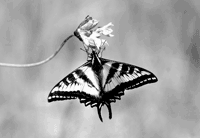
Pinnacles staff seeks volunteers to head-off the weeds before
they conquer vast areas of the park
Hollister
– Foreign weeds have begun their annual spring invasion of
Pinnacles National Monument, prompting park staff to put out the
call for volunteers to enlist in the annual fight to slow the
weeds’ advance and stop them from taking ground from native plant
species.
Hollister – Foreign weeds have begun their annual spring invasion of Pinnacles National Monument, prompting park staff to put out the call for volunteers to enlist in the annual fight to slow the weeds’ advance and stop them from taking ground from native plant species.
As they do every year, seeds from a variety of non-native weeds have sprouted at Pinnacles and are growing strong at the park, according to field technician Alacia Welch. As they flourish, native plant species are choked out, according Welch. When native plants die off, she added, animals and insects that depend on them for food and shelter are forced to other areas of the park – refugees in the war against the weeds.
“All plants pulled and sprayed in the park are non-native. All are considered invasive,” Welch said. “They change the whole ecosystem of an area because they grow faster and make more seeds.”
With only about four park staff members fighting on the weed front, Pinnacles is asking for groups of volunteers to spend a day or two at the park pulling weeds in an effort to manage the problem. Last year, 166 volunteers took part and pulled thousands of offending weeds, according to Valerie Nuttman, biological science technician.
Among the weeds leading the assault against native plants at the Pinnacles are: bull thistle, summer mustard, stinkweed and poison hemlock – the plant that Greek philosopher Socrates used to carry out his state-mandated suicide in 399 BC.
The seeds of non-native weeds arrive in California in a variety of ways, according to Welch. Star thistle seeds, for example, might cross the border in a bag of cattle feed, she said. Once in the state, seeds are often transported to Pinnacles on the cars and clothes of unsuspecting visitors, Welch said.
“They’re not usually brought over intentionally,” she said. “It doesn’t take much. The seeds transfer very easily.”
Heavy rains – both this year and last – have made the weed problem worse this year, providing extra water for more seeds to sprout and thrive, Welch said.
Large volunteer groups are able to concentrate several hours to a specific area and pull as many as 15,000 weeds in a day, Welch said. In addition to aiding in the cause, members of volunteer groups also get a chance to spend time in communing with nature and learning more about flora and fauna at Pinnacles, she said.
“Volunteers can go to one huge area and get all the weeds,” Welch said. “They really increase efficiency.”
In addition to hand pulling weeds, Pinnacles staff spray unwanted non-native plants with herbicide, according to the park’s web site.
Those interested in volunteering should call Pinnacles National Monument at (831) 389-4485 x 272.
Luke Roney covers local government and the environment for the Free Lance. Reach him at 831-637-5566 ext. 335 or at lr****@***********ws.com








